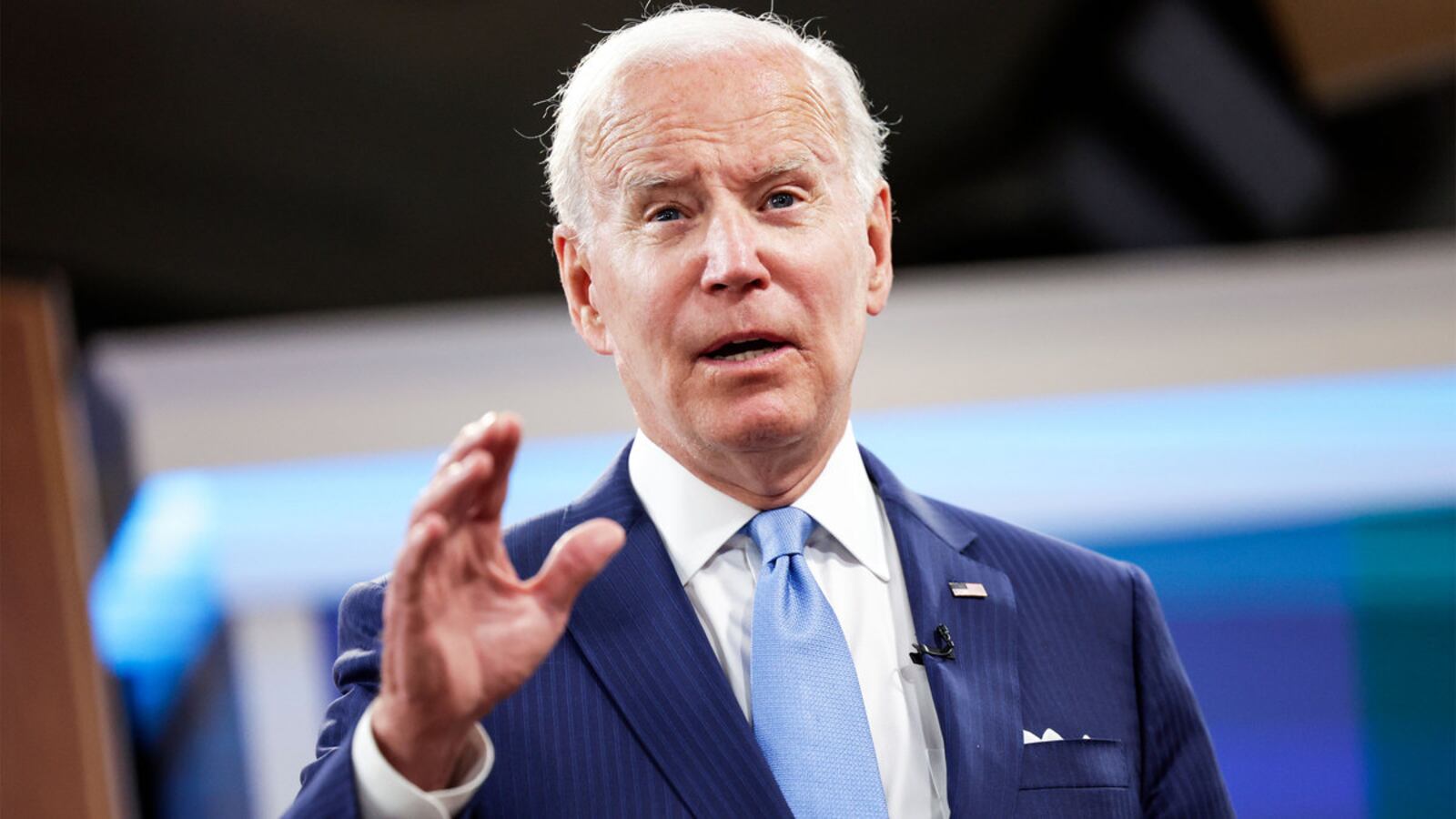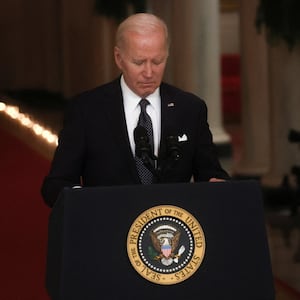President Joe Biden campaigned on being a dealmaker—touting his years in the Senate as evidence of his mastery of working with Congress to pass ambitious legislation. But in recent months, even some of the president’s allies on the Hill are concerned that he is taking an increasingly “hands-off” approach to his biggest legislative priorities.
After a series of high-profile failures in Congress to pass the president’s top agenda items, his supporters both in the Democratic caucus and within advocacy groups that have backed his policies are increasingly anxious that the president is drifting into the background of his party’s most closely watched policy negotiations. Lawmakers, they say, are increasingly left to their own devices on guns, abortion, and even the high-profile hearings on his predecessor’s attempts to overturn the 2020 election.
“I don’t know when the breakdown happened,” vented one senior Democratic House aide. “But there just isn’t a White House legislative strategy. They're very laissez-faire—like, ‘Joe Biden told you what he wanted, it’s your job to go make it happen and he would love to sign it.’ But there’s no actual action on their end.”
Those frustrated with Biden’s perceived distance from the legislative process cite his non-participation in negotiations over a gun safety framework being conducted by many of his former Senate colleagues, lackluster lobbying in getting all of the Democratic Party’s members to support a failed bill to codify Roe v. Wade into law, and the administration’s refusal to wade into the Jan. 6 hearings as proof that the president is letting Congress steer his agenda.
Biden hasn’t always been this hands-off. Last year, he stopped by Capitol Hill to stump for his social spending program, the Build Back Better Act. He was regularly meeting with lawmakers. He huddled with Democrats from all ends of the party’s spectrum to find compromise. He made a similar visit to the Capitol to push for voting rights, imploring moderate Sens. Kyrsten Sinema (D-AZ) and Joe Manchin (D-WV) to enact a filibuster carveout for voting-rights legislation.
But in both instances he failed.
No new voting-rights bills were passed. The filibuster remained perfectly intact. The Build Back Better bill went on a slow walk towards death. And it became apparent that, despite campaigning on a supposed ability to get things done in Congress, the president doesn’t have much sway over moderate Democrats—or Republicans.
Outside backers of Biden’s agenda emphasized to The Daily Beast that they don’t doubt the president’s commitment to the issues that they care about, citing the hard reality of the Senate’s dysfunction as the root of the problem.
“He has already stated that he will sign legislation to address gun violence. He has supported this framework. He has repeatedly called on the Senate to pass the comprehensive and bipartisan bills passed by the House of Representatives in 2021. He has called on both chambers to go further and to pass a ban on weapons of war and repeal special protections for the gun lobby,” said Christian Heyne, vice president of policy at gun-reform group Brady. “We continue to urge the president to go further and go bolder, but he has not held up this process nor has he stayed quiet on this issue.”
Still, in the months since the twin failures on Build Back Better and voting-rights legislation, Democrats’ long list of remaining priorities haven’t received the same level of backing that the administration provided during negotiations over the American Rescue Plan or the bipartisan infrastructure bill.
“We had so many resources to go into our districts and sell it to local media that was then amplified by the White House,” said the senior aide. “Now more than ever is when you send someone over to the Hill to say, this is why it's a priority, this is why you need to be happy about it, this is our strategy in making that deal. That’s just not happening.”
On guns, Biden made a broad ask for Congress to pass something, he didn’t publicly get in the weeds with lawmakers on what that something would be. And though lawmakers did ultimately reach a deal on a framework including expanded background checks for people under 21, state grants for red flag laws and more, it’s small and the legislation hasn’t been written yet.
Proponents of the emerging bipartisan deal say that’s by design. With the filibuster still neatly intact, the package had to be palatable enough to garner support from 10 Republicans in the Senate.
But some on the Hill are questioning if Democrats could have gotten more—if they were only given more support from the president and the White House.
“I don’t think they have a [legislative] affairs department,” the senior Democratic House aide said. “There's mounting frustration on the Hill, because like, this gun bill, no one’s actually happy about it in the House. This is not what we wanted. We let the Republicans reclaim the framing of this and gave them the talking point that they helped us do something and never have to do it again.”
Senators have still made pilgrimages to the White House, just last week Sen. Chris Murphy went there to talk about the movement on the gun issue but the traffic has only gone one way on Pennsylvania Avenue.
A White House official told The Daily Beast that Biden “uniquely understands” the distinction between being involved without micromanaging and that “he knows where it’s helpful to be most involved versus not.”
“Sometimes you do direct negotiating, sometimes you don’t, sometimes you talk about those discussions publicly, sometimes you don’t—but he and his team are always deeply involved,” the official said, noting that the passage of the American Rescue Plan and the infrastructure package, both historic pieces of legislation, were the result of aggressive legislative affairs work by the White House.
Some Democrats suggested that the step back might be by design. Having the president involved in high-stakes negotiations automatically intensifies the situation—and likely doesn’t soften Republicans’ stances on a given issue.
“I think some of my colleagues in the Senate, particularly Republicans, prefer a lower profile negotiation process… When you’ve got to go to the president, that’s like going to the big gun. That’s like going to a bazooka. And if we can get things done without going to the big gun, that’s a good thing,” Rep. Jamaal Bowman (D-N.Y.) said.
Asked if Biden stepping in would have made a difference, Bowman said he wasn’t sure, but noted that he does give the president credit for previous policy wins.
There’s not much time left until Democrats leave for August recess—and when they return, Congress is expected to slow down dramatically so members can focus on their midterms campaigns. That leaves little time for Democrats to enact meaningful legislation, particularly given the likelihood of losing the House after the November elections.
The idea that Biden is happy to sign legislation supporting his agenda but isn’t supporting the dirty work to get it passed isn’t new.
For months, Biden said if Congress passed a bill to cancel student debt, he’d sign it. But he’s not publicly worked toward passage of such a bill—nor has he taken executive action.
Rep. Pramila Jayapal (D-WA), chair of the Congressional Progressive Caucus, told reporters Monday she’s been in constant touch with the administration on the issue and believes cancellation should be done sooner rather than later. She suspects recent events, including the spate of shootings in Uvalde and Buffalo, have caused some holdups on progress.
“I think we were hoping that perhaps the announcement would be around the graduation speech that President Biden gave, but it was right when this all broke out.”
On Democrats’ latest reconciliation talks, which hope to pass some form of economic reforms, Biden has largely stayed out of the way. Rep. Ro Khanna (D-CA) told The Daily Beast he suspects the president is waiting to get involved until some progress is made, adding that “his leadership to get climate over the top would help.”
Regarding the congressional investigation into Jan. 6, the White House has also pointed to the legal sensitivity of the hearings as a reason the president has assiduously avoided discussing. With the potential for criminal referrals to come out of the hearing, Biden weighing in could be perceived as attempting to influence the Justice Department, something that Biden swore on the campaign trail never to do.
But that argument doesn’t apply to other agenda items.
On abortion, Biden has urged Congress to codify abortion rights into law, but he’s not stopped by the Hill or made any significant proposals on how to bypass Republican opposition in the Senate, other than urging voters to elect more Democrats. And though the president promised a “whole of government approach” to protecting abortion rights, his plan remains unclear.
The Supreme Court has only 18 opinions left to release this cycle—and one could overturn Roe v. Wade in an instant.
“We want the president to have a hands on approach to every crisis facing the American people and that includes the public health emergency for abortion access right now. People who are having abortions need to hear from the president that he has our backs and will show up for us,” said Renee Bracey Sherman, founder and executive director of We Testify, an organization that represents those who have had abortions.
“The American people need to hear from the President about his plan and how abortion access is critical to economic justice, racial justice, and health care in this nation,” Bracey Sherman added. “He is our nation's leader and we need to hear from him. We need to see him in action. It's not too late, but the clock is ticking.”









